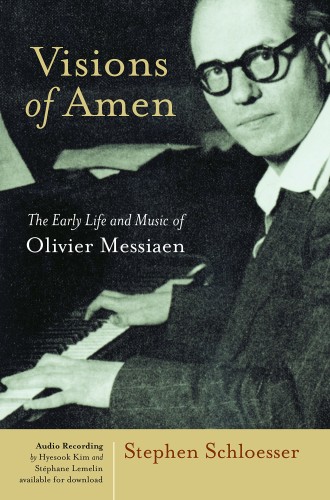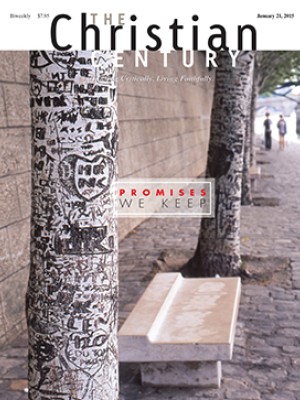Visions of Amen, by Stephen Schloesser
Apart from the exceptional figure of Johann Sebastian Bach, probably no Western composer of stature has been so thoroughly correlated with a nuanced Christian theology as has the French modernist Olivier Messiaen (1908–1992). But whereas many would read Bach’s extraordinary musical accomplishment as expressive of his Lutheran culture, Messiaen’s work appears to be not in solidarity with but in opposition to his own culture: the cynical secularism of the 20th-century avant-garde.
As we have learned from much probing scholarship since Messiaen’s death, this image of a Christian composer singled out from the pack is the one he carefully fashioned for himself. According to his own narrative, Messiaen was not raised in the doctrines of the Catholic faith but rather was “born a believer,” destined on his path as a “musician of joy.” This unlikely Delphic persona—the pious church organist with a groundbreaking musical language motivated by the complexities of Catholic doctrine, from whose Parisian classroom nevertheless issued some of the most iconoclastic composers of secular modernism—is the Messiaen deconstructed by an impressive corpus of recent work.
Read our latest issue or browse back issues.
That corpus has once again expanded with Stephen Schloesser’s Visions of Amen, at 594 pages the heftiest single-author study of the composer in English. Significantly, Schloesser’s field is not music but modern European history, which he teaches at Loyola University Chicago. His previous monograph on Parisian Catholic culture between the world wars (Jazz Age Catholicism, published in 2005) informs the newer work. A consideration of Messiaen’s person and music through the lens of a broad-based cultural history is both fitting and welcome.
Schloesser builds his book around a detailed examination of Messiaen’s seven-movement Visions of Amen for two pianos (1943), which, Schloesser argues, “offers a convenient end point for this first epoch in Messiaen’s life.” The reader can listen to a performance of the piece by the pianists Hyesook Kim and Stéphane Lemelin, downloadable without cost from a URL cited in the book; the recording corresponds to a formal analysis of each movement that Schloesser includes as an appendix.
The author is careful to condition his approach for a wide readership: he minimizes musical-technical terminology, and the intricacies of Messiaen’s tonal language take a backseat to contextual analysis. Accordingly, Schloesser allows the music to dialogue intimately with aspects of the composer’s biography, and he considers how Messiaen’s disparate interests—Catholic doctrine, ancient and modern literature, metaphysics, currents of surrealism and symbolism, ornithology, astronomy, Eastern music and religions, and many more—express themselves in his music.
But the book is about a great deal more than the position of a single work in the composer’s oeuvre. In fact one might argue that this study tries to do too many things simultaneously. The subtitle is right only in a limited sense: certainly, the nine chapters that precede the discussion of Visions offer original and sometimes piercing analyses of the composer’s parents, his conflicted home life as a child, the remarkable nexus of his formative influences, and the personal tragedies he absorbed, all in counterpoint with his compositions through the early 1940s. But three final chapters consider the music from this point through the end of the composer’s life, admittedly in a more cursory though no less insightful manner.
In the final three chapters Schloesser suggests that Messiaen’s later music revisits the thematic concerns of earlier works. For instance, he contends that Messiaen’s last organ work, the monumental Book of the Blessed Sacrament (1984), represents a return to and expansion of the theological concerns of his first piece for organ, The Celestial Banquet (1928).
In the book’s earlier sections Schloesser shows how Messiaen’s music of the 1920s and ’30s points to works of later decades: the organ cycle The Nativity of the Lord (1935), for example, shares with the oratorio The Transfiguration (1969) the doctrine of divine adoption as its theological center.
Despite the title, Schloesser’s accomplishment does not have to do primarily with the close-up examinations of Messiaen’s formative years and his Visions cycle. He advances a decidedly holistic portrait of the composer, whose consistent emphasis on the transcendent joy of divine truth was motivated by, among other things, a sense of impermanence and profound grief in his lived experience.
As Schloesser’s narrative demonstrates, Messiaen’s encounter with tragedy extended beyond family losses during the Great War and his own imprisonment during World War II to include the three women in his life. His mother, the poet Cécile Sauvage, overwhelmed by depression and frail health, died in 1927 when the composer was not yet 20. His first wife, the violinist and composer Claire Delbos, whose courtship with and marriage to Messiaen ensued in the midst of the composer’s “grief works,” suffered an agonizing mental decline and long institutionalization until her death in 1959. His introduction to his second wife, the pianist Yvonne Loriod, overlapped the difficult period of Claire’s deterioration. The music’s thematic substance takes on a fascinating texture when considered against this dynamic of love, loss, and love regained.
No one will accuse Schloesser of being laconic. Readers are confronted with a formidable apparatus of source citations, footnoted commentaries, and explorations of contemporary thought that lope deftly from Henri Bergson and Jacques Maritain to Walt Disney and Orson Welles, and from currents of Catholic revivalism to cultures of drug-induced hallucinations, the history of excommunication rites, and much more. All this is perhaps a manifestation of the “excess of Truth” to which St. Francis refers in Messiaen’s gigantic opera St. Francis of Assisi. In any case, Visions of Amen offers much worthwhile insight for anyone willing to navigate, as Schloesser does, the stunning multidimensionality of Messiaen’s life and work.






